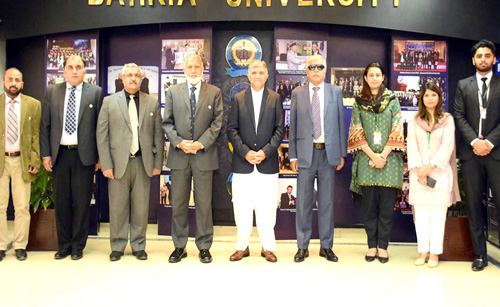Staff Reporter
Bahria University’s National Institute of Maritime Affairs – NIMA organized an interactive webinar on an important current topic “China-Iran Emerging Maritime Cooperation and Opportunities for Pakistan”. National Institute of Maritime Affairs is constituent unit of Bahria University working to broaden the scope of Maritime Research as National Think Tank.
Admiral Asif Sandila NI(M), Former Chief of the Naval Staff graced the occasion as chief guest whereas, eminent speakers such as Ambassador Aizaz Ahmad Chaudhry Director General ISSI, Vice Admiral (Retd) Asaf Humayun Former Vice Chief of Naval Staff, and Capt (Retd) Hassan Daud Butt CEO Khyber Pakhtunkhwa Board of Investment & Trade, shared their intellectual insights with the audience.
Vice Admiral (Retd) Abdul Aleem HI(M), Director General NIMA welcomed all the worthy speakers and participants in the webinar and highlighted the trilateral maritime cooperation of Pakistan, China and Iran.
Commodore (Retd) Baber Bilal SI(M) set the stage about the China and Iran emerging maritime partnerships and its prospects for Pakistan. While speaking with the audience, Ambassador Aizaz Ahmad Chaudhry shared his intellectual insights about genesis of China & Iran strategic partnerships and its opportunities for Pakistan. Vice Admiral (Retd) Asaf Humayun highlighted the linkage of Gawadar and Chabahar as sister ports, their challenges and opportunities and its impacts on Pakistan economy. Capt Butt shed light on the prospects of China, Iran and Pakistan partnerships in the Belt and Road Initiative (BRI).
At the end of the webinar, the Chief Guest Admiral Asif Sandila NI(M) applauded the efforts put in by NIMA for bringing together policy makers and academician to highlight this strategic issue, its impact on regional and global environment and its prospects for Pakistan. He also hoped that NIMA will keep on playing its significant role in advocating local and regional issues to raise awareness and provide policy recommendations to the policy makers in the country.
Large number of attendees from academia, foreign policy experts, university students, government departments, and think tanks actively participated in the webinar.










